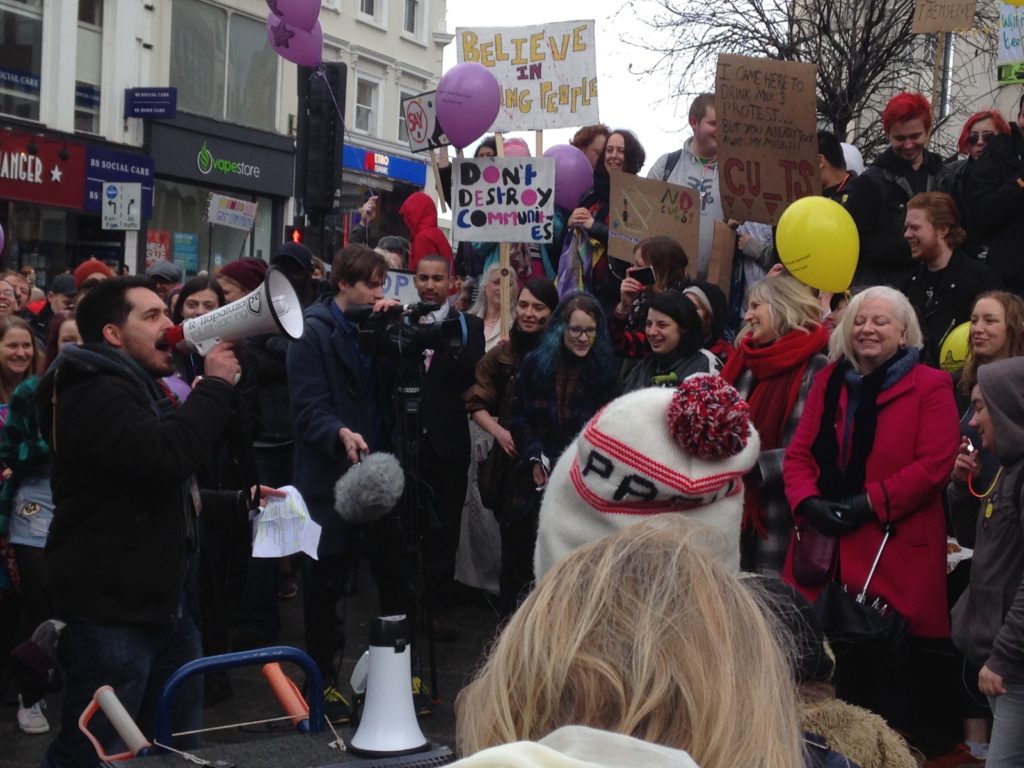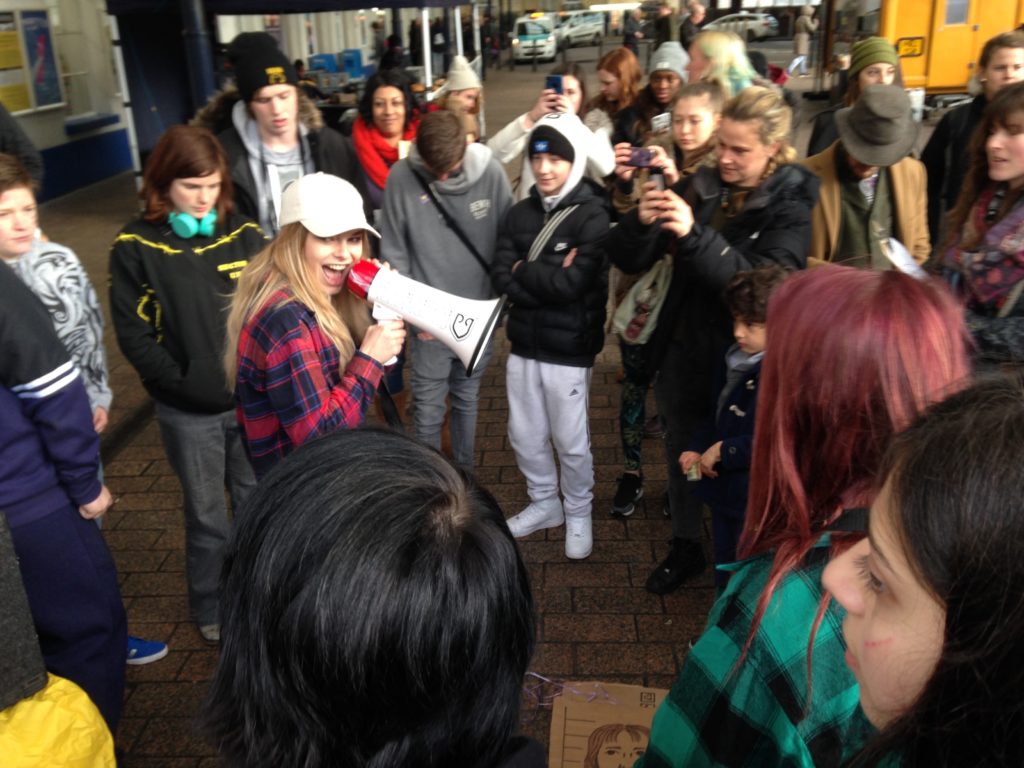By Eva Baker, member of the TDC Youth Team
Here at the TDC, we were all shocked and saddened when we heard the leaked news that Brighton and Hove Council were about to cut 100% of their budget for youth work in the city. Although in the third sector we have all grown accustomed to words like ‘cuts’ and ‘austerity’, this was a particularly extreme circumstance, and a hard blow for everyone at the organisation to take. Our jobs were now on the line, not to mention the future of the youth centres and projects we run in the city.
However, instead of getting overwhelmed and just plain sad about it all, myself and the youth workers at the TDC have spent the last weeks and months educating, informing and collaborating with young people around how we can all take positive actions to oppose the cuts together. We have spent sessions painting colourful banners, having open discussions about politics and the role it plays in all our lives, signing petitions and working out ways we can all collaborate to make sure our voices are heard and our opinions represented.

Youth work is perhaps one of the ‘easiest’ things for local governments to cut in times of austerity, and this is nothing new. I’m not sure exactly why this is, but it could be because it can be difficult to measure the tangible effects of this type of work, and that makes it easier for governments to dismiss it as having limited value. Whilst it’s easy for a teacher to say X amount of my kids passed their History exam this year, it’s harder for a youth worker to say, we have kept X many young people out of jail, prevented X teenage pregnancies and offered invaluable moments of support, friendship and inspiration to X many young people X times a week. Youth work is often referred to as ‘informal education’, and in many ways what we offer is a unique space and support that young people may not get at school or at home.
As a youth worker I’m inclined to say that the work we do is essential, and obviously the thought of cuts makes me angry as well as frustrated. I believe youth workers are important role models, rather than authority figures like teachers and parents, and that’s a very unique and powerful role to play in someone’s life. I feel very privileged to do the work I do, and I believe the profession should be valued and protected, not scrapped.
I would describe our youth club as a place where open discussion is encouraged; a space where creativity can bloom; a place where antisocial and damaging behaviour is gently and sensitively corrected by example. I am fully aware of the consequences of removing a bedrock of support like a youth centre from young people in some of the country’s poorest communities. But much better I leave it to the young people themselves to tell you what they think, as they are, of course, the experts.

So picture the scene: it’s a cold evening in Bevendean in December at the Writing and Journalism Club I run with a group of young men. It’s been a couple of weeks since getting the news about the cuts, and word has travelled fast round the estate. I’m doing my best to brush off endless questions.
“Are you gonna get the sack?” (sensitively put as always…)
“Will they close the youth centre now?”
“Will there be no more trips in the summer? What about writing club?”
That evening, I found it uncomfortable that I didn’t have any easy answers to tell the boys, but I realised that avoiding the issue was not an option, especially as the group seemed so preoccupied with the news of cuts that they couldn’t concentrate on the writing activity we were trying to do together.
The mood was already low, so I decided to not shy away from the hard reality and open up the discussion; to engage with their feelings on the subject. The moment that sticks most clearly in my head was when I asked the boys about the worst case scenario.
“What do you think will happen if the youth centres do close down and the youth workers do get sacked as you keep asking me about?”
A long pause as the lads looked at the floor. They seemed depressed and uninspired. They had that look on their faces that said, ‘It’s happening again. We’re being left out.’
After what seemed like a long moment of silence one of them piped up: “More people will take drugs.”
Another: “More vandalism around the estate, more people getting into trouble. More lads fighting.”
And another still, “We’ll just be sooooooo bored!”
This last point was quickly backed up by groans and murmurs of agreement.
It was all getting a bit doom and gloom, so we went on to talk about solutions: protests, petitions, campaigning, something which many of them ended up really getting on board with in the weeks that followed. After the session, on the bus home I was feeling a little depressed. The main thing that kept running through my head after reasoning with the boys was ‘Young people are so much smarter than people realise. And they know exactly where they are and what kind of world they live in. An investment in them is an investment in the future. Why don’t the government realise that?’
The sad truth is much of the rest of the country has already been affected by the brutal cuts made to public services as a response to the banking crisis back in 2008. Having spent seven years working with young Londoners in some of the most marginalised and violent parts of the city, I have seen with my own eyes the effects cuts to youth services have had in areas where people are already struggling.
In marginalised parts of London like Tower Hamlets, Hackney, Islington and Lewisham where youth services were cut between 2010 and 2015, there has been an increase in street violence, antisocial behaviour, and a spike in incidents of knife crime and murder amongst young people. It’s a cautionary tale that we shouldn’t be closing our eyes to, and councillors making decision to cut youth services anywhere should be made aware of this information and evidence, and deterred by it. Cuts may ‘save’ money in the short term, but in the long term the effects of cutting youth services can mean more young people making bad decisions that result in drug use, prison time, or violence; all of this comes in at an immeasurable cost to both government budgets and society as a whole.
The last thing I want to say is this. The moment a legislation is made by councillors in boardrooms to take this type of decision is very different from the numerous moments which happens as consequence when the cuts begin to take effect. The first is a bureaucratic decision involving speculation, documents, number crunching and power point presentations that can all be early read, signed off and ‘justified’. The moment when a young person sees a door close to them, which was once open, is harder to measure, but much more devastating.
Sources / further reading
http://www.bbc.co.uk/news/uk-england-london-37412508
https://www.theguardian.com/uk/2011/jul/29/gang-violence-rises-as-councils-cut-youth-services
https://www.london.gov.uk/sites/default/files/london_lost_youth_services_sian_berry_jan2017.pdf
